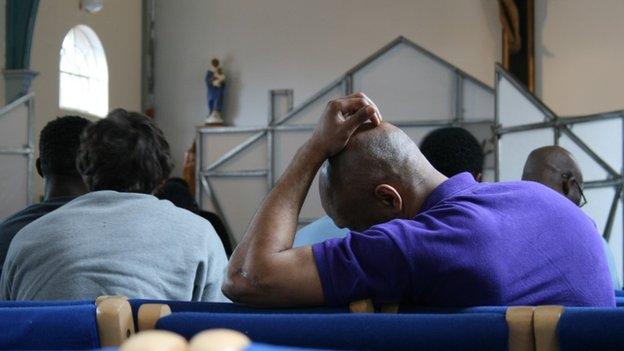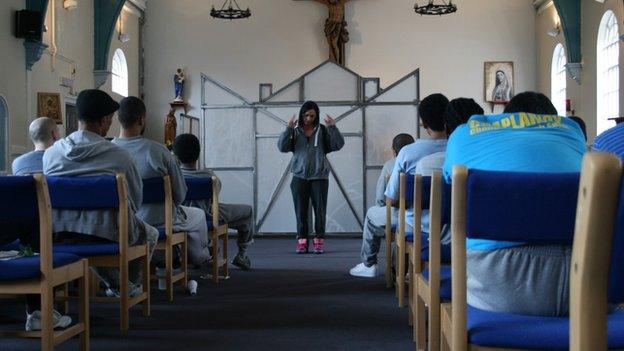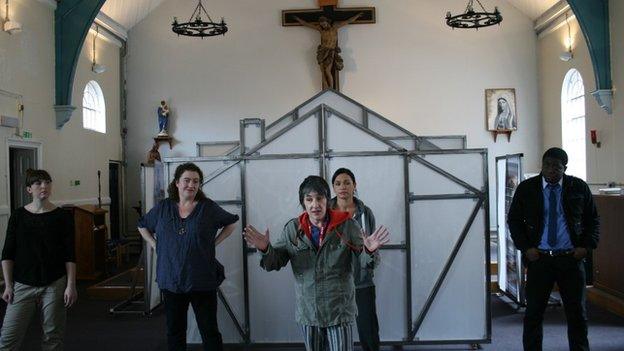Cardboard Citizens: Acting out a positive future
- Published
Former prisoner, Errol McGlashan speaks to the BBC about his rehabilitation
A theatre group comprising actors who were once homeless or in prison is touring the country in an effort to intervene in the lives of offenders leaving jail. But how can theatre make a difference to the life of a convicted criminal?
Jess runs across the kitchen and punches her mother's boyfriend, Paul. He reels away from her almighty right hook. The family begins to disintegrate. Jess ends up pregnant on the streets.
It's like EastEnders - and then some - and with a very unusual audience.
The front rows of the chapel at HMP Wandsworth are full of inmates cheering from the moment the narrator warned there would be strong language, violence and "scenes of a sexual nature... can you handle it?"
"Go on ask us again," jokes one of the inmates.
Glasshouse, a play by the Cardboard Citizens theatre group, is on tour to jails, hostels and venues nationwide.
This is theatre with social conscience. Glasshouse charts the consequences when a family falls apart.

Cardboard Citizens invites inmates who are approaching their release date to join the organisation
And it's theatre based on experience. Almost every member of Cardboard Citizens has been homeless. Some members are ex-offenders. One of them, Errol McGlashan, external, formerly of HMP Pentonville, is at Wandsworth to talk to the young inmates about his experiences.
The 15-year-old theatre company takes its shows inside jails to help prisoners go straight once they're outside.
"Change is hard to do when everyone around you thinks the worst of you," is one of Jess's best lines in the play. It's one of the few moments when the prisoners are really quiet.
The government has already embarked on what it says is a rehabilitation revolution - although it could take years to make any difference to stubbornly high reoffending rates, external.
The factors - or "pathways" - in reducing reoffending are well-documented - and one of them is to prevent people leaving prison becoming homeless.
So how can a theatre group do anything about that?
Radical theatre

The cast challenge the inmates to improvise new scenes with a better outcome
Glasshouse isn't just a performance - it's an invitation to the audience to challenge the script and change the outcome.
After the show finishes, the cast get the prisoners to debate each character's problems, actions and mistakes. Then they challenge the inmates to stop the action, come on to the stage and improvise how the scene should have played out.
This theatrical technique was developed by radical Brazilian dramatist Augusto Boal, , externalwho believed that the stage is a forum for social change, reaching out to the most marginalised in society
So the actors reach out, the inmates are invited up, and by the end of the afternoon they're all talking about what they would have done differently.
It's all rather subtly done. Nothing heavy-handed, no probation-type assessments of how well the prisoners have engaged.
And then the really clever bit happens. The inmates who are due out soon are asked to sign up.
When they walk out of the prison gates, Cardboard Citizens will chase them to come to a workshop where they will get the chance to talk about their life, act and role-play and receive impartial advice on how to move on.
In the last year, almost 500 deeply marginalised people, some with extremely complex problems, have become members of Cardboard Citizens. About one in seven of those is already in a job, education or training.
Giving courage
"We can't give them a home - but we can give them courage," says Rowen Rutter, one of Cardboard's producers.

Most of Cardboard Citizens peformers have a history of homelessness
"We function as a vehicle to bridge the gap. What we offer is a safe space for people to be themselves, to speak freely, to educate themselves and to find a way to reintegrate themselves into society."
Jo, one of the actors at Wandsworth, was living in a hostel when she came across Cardboard Citizens.
Six years later, she is taking part in her fourth nationwide tour and explains how art helped her to address her life.
"I was always hiding my problems or pushing them away, just trying to pretend everything was normal," she says. "At Cardboard Citizens, you are taken for who you are. If I hadn't found them, I don't know what would have happened, whether I would have been able to keep a flat, or work.
"Don't give up - there is always help. And engaging in something creative allowed me to rediscover myself."
Glasshouse is touring nationally during April and May., external